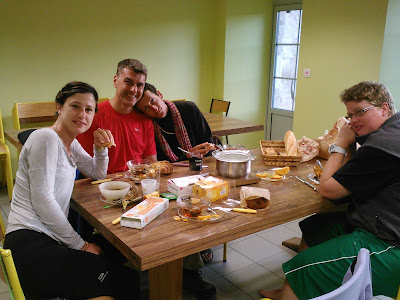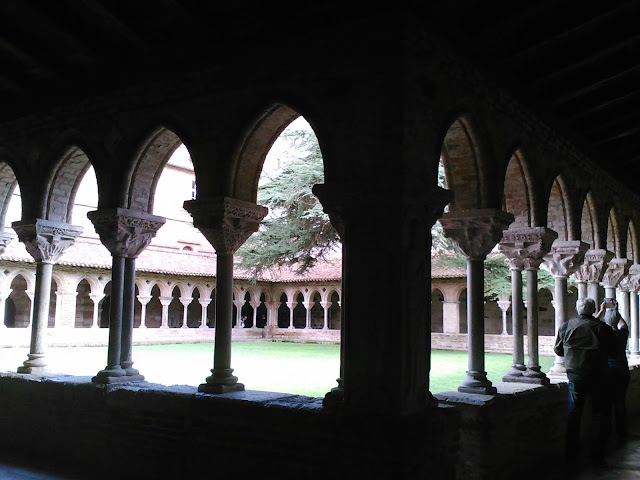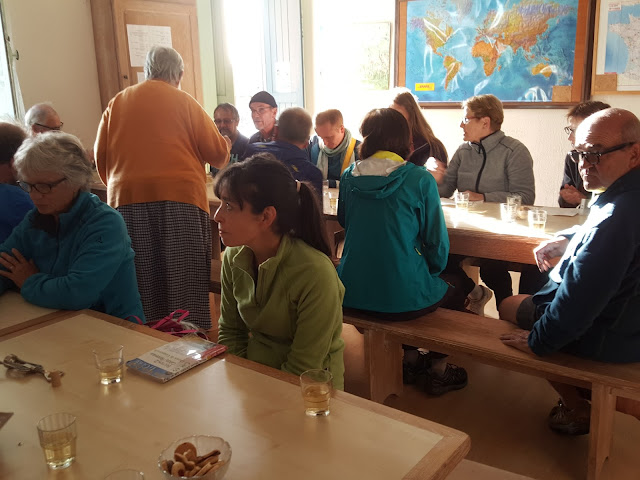I am now back in Paris, having spent
over a week here, and have glanced at my photos from the past few years
of walking the route from Le Puy-en-Velay, reflecting on my walk. It
has been an interesting experience. Was it life-changing? Probably
not, at least not in the grander sense, but a worthwhile experience
nevertheless. I walked over a period of four years, more or less at the
same time of year (September/October). The weather varied, as did the
terrain. The first half was undulating and hilly, mostly at higher
elevations, and often rocky, the second half fairly flat for the most
part, and the route often paved until I reached the foothills of the
Pyrenées. My walk was continuous in the sense that I continued were I
stopped off the previous year, which gave it a sense of continuity,
although sometimes the weather conditions would be completely
different---hot and summer-like one year, cold and rainy the next. The
cold weather is actually more pleasant to walk in, and a light spitting
rain is fine, but serious rain over a period of days can create mud and
water runoff that can be a problem...
My first trek to Conques from Le Puy was
in October, and the perfect time to walk. Unfortunately after the first
week, the gîtes d'étape start to close in the higher elevations and
places to stay became further and further apart, a bit of a problem for
those of us that prefer not to do more that 15 - 18 km/day. This is a
much-traveled part of the Via Podiensis, and many people never walk
beyond this initial portion. The Aubrac is probably the most enjoyed
region for its austere natural beauty, and, for me, Conques was a great
place to end because of its history (Sainte Foy) and its picturesque quaintness. It was a fairly spiritual time for me as I frequently walked with practicing Catholics.
 |
| My walking companions |
 |
| the Aubrac |
 |
| Conques |
The second segment that I did was actually a variant of the route.
I had seen photographs of the Célé Valley from a posting in one of the
Camino FB groups, and was immediately seduced by the spectacular
landscape. Although it was difficult terrain to walk at times, being
both hilly and rocky, walking along the tops of the limestone cliffs, it
was an opportunity to continue enjoying the sheer beauty of the
landscape. The 9th century ruins of the abbey of St. Peter and church
at Marcilhac, the medieval town of St. Cirq-Lapopie, and the prehistoric
Pech Merle cave paintings were pluses.
 |
| church, Marcilhac-sur-Célé |
|
|
|
|
 |
| St. Cirq-Lapopie |
Finishing up at Moissac brought me back
to a historical church and monastery, whose origins actually date back
to the 7th century, and a major stopping place along the pilgrimage
route to Santiago de
Compostela. Legend and tradition maintain that a church has existed on this site since the late 5th century. The
Cluniac Abbey of Saint-Pierre and its cloister were a high point from a
historic point of view, Moissac being mentioned in the Codex Calixtinus.
 |
| Abbey of St. Peter of Moissac |
|
|
The third segment of my walk began here in Moissac again, and continued on to Aire sur l'Adour, with the church of St. Quitterie,
another popular stopping place along the pilgrimage route. For me this
portion was somewhat of an endurance test because of the unusual
September heat. Walking along the canal to Auvillar was shaded, but as I
continued on to Miradoux and beyond it grew worse. The sun was
brilliant, however, and the countryside, even when sparse and
uninteresting, looked its best. With a backdrop of azure blue the little
towns sparkled.
 |
| Auvillar |
 |
| St. Antoine de Pont d'Arratz |
 |
| La Romieu--the abbey |
 |
| Larressingle |
 |
| the church at Lanne Soubiran |
But what a difference a year made. My
final September was no longer an Indian summer, but the beginning of a
rainy and cool autumn. The scenery became less interesting until I
reached the Pyrenées, and relationships with people took on greater
significance. Walking with someone makes the time go more quickly,
particularly when the landscape is dreary, or the terrain difficult. I
became aware of walking parties: groups of friends, couples walking
together, brother and sister, aunt and niece... Although I had always
walked by myself, and many, many people do, there were times when it was
nice to walk with someone else, even for a kilometer or so.
 |
| taking a break in a church along the way |
 |
| dinner in Arthez de Béarn |
 |
| pilgrim welcome in Navarrenx |
 |
| traveling back to Bayonne via the train |
A year ago
I had spent much time with an English woman from Oxford, this year it
was almost exclusively with French-speaking people from all over
France. I took advantage of a couple of pilgrim "welcomes" at
Arzacq and Navarrenx, and enjoyed dinners together at the gîtes d'étape,
whether sharing the kitchen and my meager food supplies with others, or
in demi-pension.
When I took the variant to St. Palais, I
lost all of my traveling companions, and the breathtaking beauty of the
Pyrenées took over again. It was so spectacular that when I finally
reached Saint Jean Pied-de-Port, the town, overrun with tourists,
suddenly seemed a disappointment. Perhaps arriving in the rain didn't
help, but still...
 |
| "Le Reflet du ciel" by Christian Lapie |
 |
| St Jean Pied-de-Port |
Perhaps no great lessons learned, just
good experiences. Some hardships, to be sure, but memorable experiences
just the same. I visited places I would have never seen otherwise, and
met people I would never have had the opportunity to meet normally.
Would I do it again? Most certainly! It is challenging--this is no
easy walk--but to those who are able to walk it, I highly recommend the
challenge.
By the way, should you wish to watch the video versions, there is one of the last segment here and a summary video of the whole walk (without narration or commentary) which can be viewed here. [Please ignore the occasional typos and occasional text omissions which seem to be inevitable.]




























